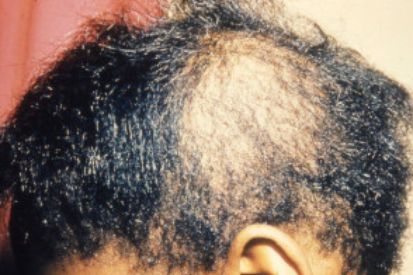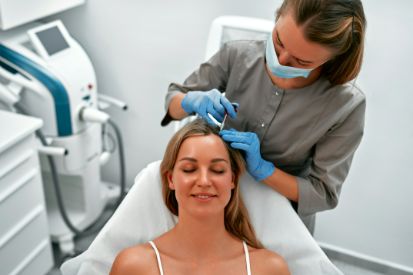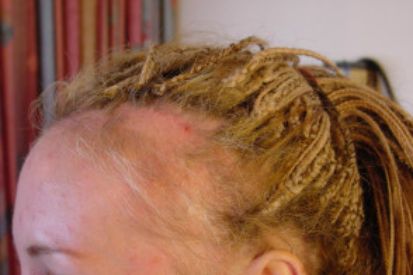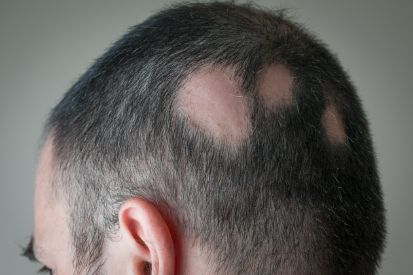Alopecia and Hair Loss
Alopecia areata is an autoimmune skin condition characterized by the body's immune system attacking its own hair follicles, leading to hair loss on the body. This condition affects over 6.5 million individuals, including children and adults alike.
If you're noticing signs of hair loss or other symptoms associated with alopecia, schedule an appointment with a dermatologist at The Dermatology & Skin Surgery Center at Creedmoor. Our dermatologists specialize in diagnosing and treating various skin and hair conditions, offering tailored treatment plans to address your unique concerns.
Examples of Alopecia and Hair Loss




What are the Symptoms of Alopecia?
- Alopecia areata: skin loses hair in round sections of varying size.
- Alopecia areata totalis: complete loss of hair on the scalp alone.
- Alopecia areata universalis: loss of hair everywhere on the body.
- Sudden appearance of a small number of round hairless patches on the scalp, followed by total scalp hair loss.
- Some experience gradual thinning as well as itching associated with their hair loss. It will typically take 6 months for total hair loss of the scalp.
What are the Causes of Alopecia?
- Genetics and hormonal changes can cause alopecia.
- Autoimmune conditions like alopecia areata prompt the immune system to attack hair follicles.
- Medical treatments, hormonal fluctuations, infections, stress, and nutritional deficiencies can contribute to hair loss.
- Alopecia may result from tight hairstyles.
- Certain diseases and aging can lead to gradual hair thinning.
How to Prevent Alopecia
Alopecia and Hair Loss FAQs
The reversibility of hair loss depends on the cause. Some types of hair loss are reversible with appropriate treatment, while others may be permanent.
It's normal to lose some hair daily as part of the natural hair growth cycle. On average, individuals may shed 50 to 100 hairs per day. However, significant hair loss that leads to visible thinning or bald patches may indicate an underlying issue. If you notice an increase in hair shedding or changes in your hair density, it's advisable to consult with your dermatologist for evaluation.
Certain hairstyles that pull tightly on the hair, such as tight ponytails, braids, or extensions, can cause a type of hair loss known as traction alopecia. Additionally, the use of harsh hair products, frequent use of heat styling tools, or chemical treatments can contribute to damage and breakage. Choosing gentle styling practices and using products suitable for your hair type can help prevent unnecessary stress on the hair shaft.
Androgenetic alopecia, commonly known as male-pattern baldness or female-pattern baldness, can affect both men and women. However, the pattern and progression of hair loss may differ between the sexes. Men often experience a receding hairline and balding at the crown, while women may notice general thinning over the top of the scalp. Other types of hair loss, such as telogen effluvium or alopecia areata, can also affect both genders.
Some types of alopecia, such as androgenetic alopecia, have a genetic component and tend to run in families.
Alopecia can affect any hair-bearing area of the body, including the scalp, eyebrows, eyelashes, and body hair.
From our QualDerm Family of Brands: Get to the Root of Your Hair or Nail Issue
Alopecia Treatments
Medical treatments for alopecia aim to address underlying causes and stimulate hair regrowth. Common approaches include but are not limited to:
- Topical and oral medications.
- Light therapy.
- And in some cases, surgical procedures.
Individuals experiencing hair loss should consult with a dermatologist to determine the most suitable treatment based on the type and cause of alopecia. Schedule with one of our experts today.
Featured Products for Hair Loss

NutraFol Men's Hair Growth Pack - 3 month
Nutrafol Men hair growth supplement is clinically tested to visibly improve hair growth, thickness, and scalp coverage. For men experiencing hair thinning. Results in 3-6 months.

NutraFol Women's Hair Growth Pack - 3 month
Physician-formulated to target root causes of thinning hair in women 18-44, including stress, lifestyle, and nutrition. Our clinically effective, natural ingredients support whole-body health for visibly thicker, stronger hair growth and less shedding.
